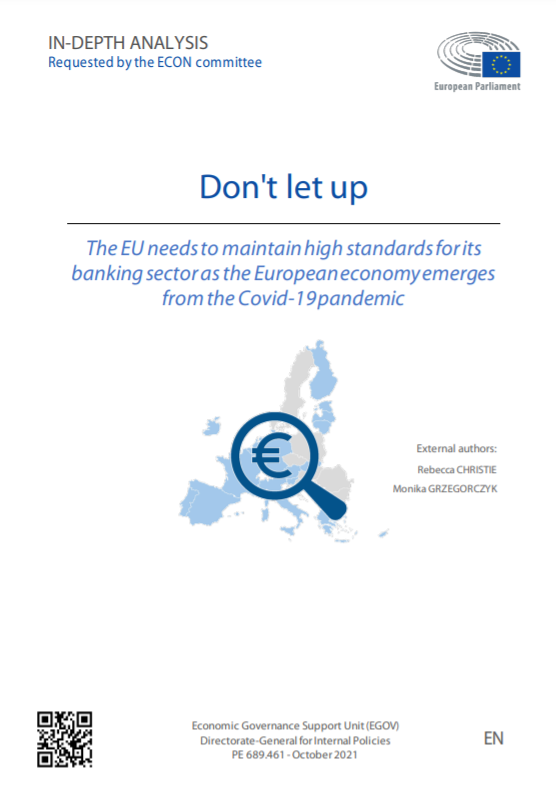Blog Post
Memo to the European Commissioner for Financial Services Policy
The Commissioner for Financial Services Policy should define and promote a vision for a sustainable global financial regulatory and supervisory order, based on the lessons from the previous major international financial crisis in 2007-09 and its aftermath. As a member of President Ursula von der Leyen’s “geopolitical Commission,” the Commissioner should lead in setting the international agenda and build global credibility by driving the corresponding “domestic” (ie EU) reforms at home. This memo focuses on the international aspects.
This blog was originally published in December 2020 as part of a special PIIE series Rebuilding the Global Economy outlining policy priorities and solutions heading into 2021.
KEY PRIORITIES
Priority 1: Create a robust and enforceable international institutional architecture for the oversight of firms that are critical to global financial infrastructure and system integrity
The ongoing (and ostensibly unstoppable) shift to a more multipolar financial system implies that the current setup, based on informal global coordination, will be increasingly unfit for the oversight of a limited number of internationally critical firms. The category includes critical financial information providers and gatekeepers such as audit networks, ratings agencies, trade repositories, some actors that may be emerging from the use of new technologies such as distributed ledgers, and perhaps internationally critical clearing houses. Banks, being ultimately tied to their currency areas and monetary policies, should not be included within that scope.
Such internationally critical firms should come under binding (ie, treaty-based) supranational legal and supervisory regimes, ensuring a common basis for trust and cross-border activity. Whether the geographical scope of such regimes should be fully global (eg, leveraging the existing framework of the Bank for International Settlements) or plurilateral (eg, bringing together the home jurisdictions of a critical mass of major international financial centres and firms) must be assessed on a case-by-case basis.
Priority 2: Streamline European representation in existing international financial regulatory bodies to enhance their global acceptance, not least by non-Western and emerging jurisdictions
The European Union and especially the euro area is indefensibly overrepresented in bodies such as the Basel Committee on Banking Supervision (BCBS) and the Financial Stability Board (FSB), not to mention the shareholding structure of the Bank for International Settlements. That representational imbalance is slowly undermining the legitimacy and effectiveness of these bodies, and the way European countries “hog the seats” reflects poorly on them too. You may attempt to negotiate their rebalancing against something useful, but the truth is that even a unilateral reduction of European overrepresentation would be in the European interest so that these bodies can retain and further develop their international relevance and authoritativeness.
To illustrate the point, the European Union represents 36 percent of the BCBS jurisdictions, 29 percent of BCBS members, 26 percent of FSB members, and 32 percent of members of the FSB Steering Committee. The corresponding figures for the United States are respectively 4, 9, 5, and 13 percent; and for China (including Hong Kong), 7, 7, 7, and 3 percent.
The BCBS is a particularly glaring case since supervisory policy is no longer set at the national level in the euro area, and thus the individual full membership thereof of no fewer than seven euro area countries (in addition to the European Central Bank and Single Supervisory Mechanism) has lost any justification other than inertia and incumbency.
In the same vein, you could also promote symbolically significant relocations of currently Europe-based organisations, eg, the FSB secretariat, to suitable alternative locations in Asia such as Singapore or Tokyo.
Priority 3: Lead by example by making the European Union fully compliant with relevant international standards
The existing European lapses of compliance have more downsides, in terms of loss of credibility for the global standard-setting bodies and loss of European influence within these, than upsides in terms of better European regulatory outcomes. In fact, full compliance would arguably be an improvement to the European regulatory framework irrespective of the positive international spillovers. The scope for this includes full compliance with the Basel III global accord as set by the BCBS and phasing out the lingering EU “carveouts” from International Financial Reporting Standards.
You should also foster effective and consistent global implementation of new standards, such as critical data elements for over-the-counter derivatives as defined under the Committee on Payments and Markets Infrastructure and the International Organisation of Securities Commission.
Priority 4: Create a seamlessly integrated euro area financial system by completing the banking union and capital markets union
This is of course your number one “domestic” (intra-EU) policy priority, but it also has positive global implications. It is the central condition for strengthening the international role of the euro and hedging against the risk of abusive weaponisation by the United States of the dollar’s dominance, eg, with financial sanctions. Fortunately, the agreement reached in 2020 on the NextGenerationEU recovery plan establishes Union bonds as a new bedrock for the European financial system and an acceptable instrument for risk sharing. As the consequences of this new reality gradually sink in over the next years, they can be expected to alleviate the political obstacles to completing the banking union, which itself is the key to fulfilling the vision of the capital markets union.
Priority 5: Establish a credible policy framework for Anti–Money Laundering (AML) supervision in the European Union
You should prioritise this issue of EU reform because policy momentum has been (sadly) created by the revelation since 2018 of major shortcomings of the existing framework, which is based on national implementation of the European Union’s five successive AML directives. You should accelerate proposals for an integrated system in which a new European AML supervisor is empowered to directly supervise (and impose financial penalties on) firms it deems most risky, while being incentivised to redelegate to the national level AML supervision of firms and sectors it deems lower-risk in line with the EU principle of subsidiarity.
Constructive cooperation with the United States and China would help on all these matters, but you should not be shy about global initiative and leadership. The United States is likely to be absorbed by domestic priorities for the foreseeable future, and in China (including Hong Kong) policy processes are likewise dominated by domestic stability concerns. There is a strong alignment between the European Union’s commitment to a sustainable international order for financial services and the aspirations of other jurisdictions such as Australia, Canada, Japan, Singapore, Switzerland and the United Kingdom, to name only the most significant from a global financial system standpoint. Even on matters where unanimity is out of reach, the European Union is best placed to catalyse critical mass coalitions that could move joint projects and actions forward.
Republishing and referencing
Bruegel considers itself a public good and takes no institutional standpoint. Anyone is free to republish and/or quote this post without prior consent. Please provide a full reference, clearly stating Bruegel and the relevant author as the source, and include a prominent hyperlink to the original post.




















